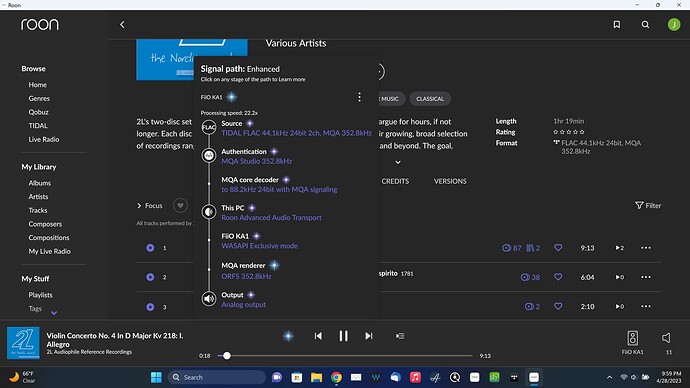Since the audio stream carries MQA signals, you need to replace the audio in the FLAC to remove MQA, so I would think that does, in a completely unmagical fashion, make the FLAC file “native” - whatever that means.
If that is in fact what Tidal is doing then yes. But they could just be forcing MQA tracks to not output MQA (like they do with their lower tier). This certainly wouldn’t be the same thing as replacing “the audio in the FLAC to remove MQA” whatever that means (I believe you mean replace the track or an entire album with a version that was never MQA to begin with?).
I don’t think it’s trivial to process the audio to remove MQA once it’s in there, but I really don’t know, and honestly, I don’t care how they do it.
Yes.
I think in my case the Bach Well Tempered Clavier Book 1 MQA stream is 48khz based, while the playable version is 16/44, simply TIDAL is streaming red book version to me, not switch off / take away any MQA signally/flag/header whatever from MQA version.
Never said it was and never said they were doing that. There’s been plenty of evidence posted online about Tidal’s lower priced tier simply playing back MQA tracks without the MQA. If one tries to play an MQA FLAC file on a system that has absolutely no MQA support at all (not even core decoding) what happens? The track is simply played without the MQA part as it is designed to. I suspect Tidal can (and has with their lower tier) take advantage of that backwards compatibility.
Yes, if the system doesn’t support MQA, it will not “unfold” anything, but that doesn’t mean MQA isn’t still there in the bits, and since Roon does support MQA, it would detect it. I don’t think it’s as easy as flipping a switch and turn MQA on and off in a track.
I never said it wasn’t still there but a system that doesn’t support MQA at all certainly doesn’t know it is, hence the backwards compatibility part.
Except they have already done it with their cheap tier so what’s stopping them from doing it service wide? As long as they eventually replace every MQA track with a version that was never MQA (or keep the existing MQA version and add an additional version that was never MQA), I’m good.
Someone from Tidal actually mentioned this on Reddit. They are phasing out MQA.
I just hope that the Albums dont disappear from my Library. I hope that the album remains there in the alternative format, or this will take some tidying up.
This week’s Friday’s new Tidal offerings include MQA albums as usual. Just tried the new Rickie Lee Jones which is streaming in 96k MQA studio authenticated
From this week releases I managed to listen to 6 and 1/2 albums. Only one MQA album and that is a second volume. Volume one was released on 17 march, Deutsche Grammophon. I would say a little less than usual but it is there.
How do you know they don’t have a different set of files for each tier?
Thanks for the references. It seems that tracks that were MQA originally are still flagged as MQA by Roon, so if they wanted to hide it, they didn’t do a good job. And if they did a good job at hiding it, it’s still arguably not the original, so it’s certainly going to disappoint some people and create another mess on top of the existing mess. When you come up with solutions for non-existent problems, chances are you’re going to create different kinds of problems.
I like MQA and hate to see it go. A random sampling of my 950 Tidal MQA files all seem to still be working properly as MQA.
Based on what I’ve experienced, Roon detects if a FLAC is MQA or not based strictly on the file tags. If the FLAC has the 3 tags that identify an MQA, then Roon does MQA core decoding. Roon does not perform an actual analysis of the FLAC content. If you put MQA tags on any FLAC file, then Roon processes it as if it were MQA (and vice versa).
For the DAC area (MQA renderer), I have not tested. But I think that the DACs proceed identically to Roon for MQA detection.
I guess it’s normal to be like that, because an analysis of the data from FLAC would involve reading the entire file and analyzing the content, which would require a period of time before playing. This does not happen, play starts almost instantly.
So, if Tidal changes bulk the MQA tags, then the user will not receive real FLACs, but MQAs unprocessed by Roon and DAC. That would be bad.
Tidal should replace the files entirely with the original FLACs.
Nope, the MQA version is still there on Tidal app. Have a look under your “versions”
Playing at 96kHz to my DAC (Tidal app performs first unfold)
That is not correct in several ways. MQA authentication/decoding is triggered through signaling embedded throughout the audio data. No tags involved. Roon will authenticate/decode an MQA encoded file without any tags. Furthermore, DACs do not read tags, MQA or otherwise. Metadata is long since stripped away by the time audio propagates downstream to any DAC.
AJ
I can provide to you sample FLACs (the same FLAC file, with and without MQA tags), if you want to try it…
Not needed. Try ripping an MQA encoded CD to a lossless format. With or without added MQA metadata tags, Roon will authenticate/decode because of embedded MQA signaling. MQA tags are required only for labeling and categorization purposes within the Roon database.
AJ

